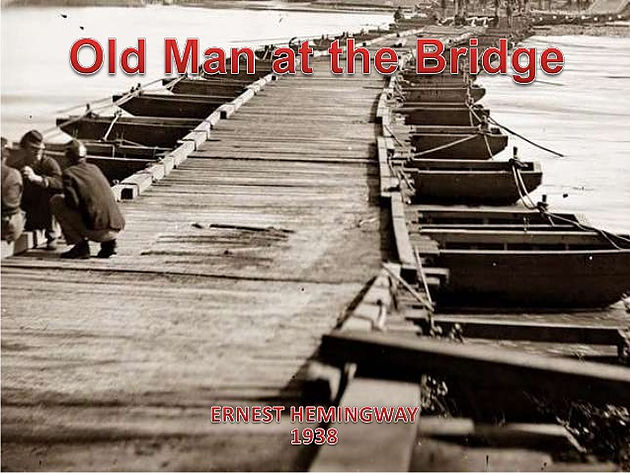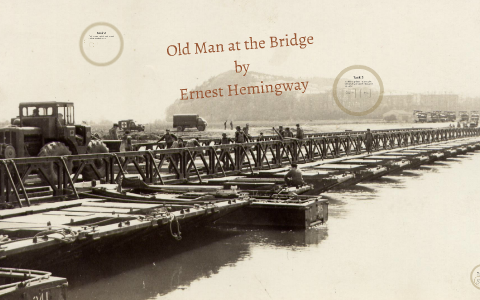Old man at
the bridge
Ernest
.Hemingway
ASSIGNMENTS
Context
Questions

I. (i) A
bridge that is made of large hollow containers filled with air is called a
Pontoon bridge.
The story is
set during the Spanish civil war and people are crossing the bridge to protect
themselves from the impending attack by the enemy troops.
(ii) The old
man is sitting by the side of the road at a pontoon bridge. The old man was too
tired to go any farther because he had already walked twelve kilometres since
he left his hometown, San Carlos.
(iii) The
unnamed narrator, who is an army scout is the speaker. He was on a mission to
cross the bridge and find out how far the enemy had advanced.
(iv) The
narrator asked the old man where did he come from. The old man replied,
"from San Carlos", and he smiled because the mention of his native
town gave him pleasure.
(v) The old
man was the last to leave because he was taking care of his animals. The old
man wore black dusty clothes and steel rimmed spectacles. His face was also
grey and dusty.
II. (i) Old
man is 'He'. He is in a weary condition as he has already walked twelve
kilometres and too tired to move farther.
(ii) He had
two goats, a cat and four pairs of pigeons.
The animals
were his family; he loved them and cared for them so much that separating from
them made him feel that he had lost his reason for existence.
(iii) He
left the animals behind in his native town of San Carlos. The heavy firing from
the enemy forced him to do so.
(iv) He had
already travelled twelve kilometres, so he was too tired to go any farther.
• He was to
weak.
• The old
man had no family and he had left his animals behind. • He felt helpless as he
couldn't save his animals; he surrendered himself to his fate.
(v) Refer to
Pointlessness of War, under Themes, Page 40.

III. (i)
Like other innocent civilians what matters to the old man is his home and
animals rather than politics. He mentions his age along with the fact that he
had already walked twelve kilometres to reflect the extent of his weariness.
(ii) The old
man wore steel rimmed spectacles; his clothes were black and dusty and his face
had turned grey from dust. In San Carlos, he was taking care of his animals.
(iii) The
place referred to is a war zone at a pontoon bridge across the Ebro river. This
place is 12 kilometres from San Carlos in Spain. It was not advisable to halt
there because it was a war zone.
(iv) The
narrator advised the old man to cross the bridge and catch a truck towards
Barcelona. But the old man replied that he did not know anyone there. However,
he thanked the narrator for his suggestion and continued to express his concern
for the fate of the animals he had left behind.
(v) The old
man is old, weak and tired. He has no family and has left his animals behind.
It is the state of helplessness that has forced him to surrender to his fate.
The old man's fate is symbolic of the fate of liberal democracy in Spain that
lost out to dictators. It does not appear that the old man could have changed
his fate because he was too old, too tired and too lonely to do so. He no
longer had the will to live as he sat by the side of the road in the war zone.

IV. (i) The
man was forced to flee from his native town, leaving behind his only family
i.e. his animals. He was concerned for them but did not know what to do so he
had a blank look. Moreover, he was a seventy-six years old man who had already
travelled twelve kilometres so he was tired. The manner in which the old man
engaged in a conversation with the narrator and told him about his village and
animals shows that he needed someone to talk to.
(ii) The old
man believed that he must watch over the cat, the goats and the pigeons in San
Carlos. The man was not able to fulfill his responsibilities so was guilty and
wondered what would the animals do in his absence.
(iii) Refer
to Conflicts in the story, under Critical Appreciation, Page 45.
(iv) Yes, it
seemed that the old man had given up on his life:
* He was not
concerned for his safety — he sat by the side of the road at a pontoon bridge
in the war zone.
* Despite
repeated insistence from the narrator to save his life and to catch a truck to
Barcelona, the old man paid no heed.
* He was
preoccupied only with the fate of his animals he had left behind in San Carlos.
* Like his
goats, he had no one to take care of him and thus he surrendered himself to his
fate.
(v) • The
narrator tries to engage in a conversation with the old man.
• He pites
the old man's condition and inquires if he had left the dove cage unlocked.
• He tries
to reassure him (old man) that the animals would be fine.
• At regular
intervals, he reminds him to cross the bridge. The narrator becomes a friend in
need for the old man but he is not able to relieve him of his worries.
• The old
man surrenders to his fate and till the end he only thinks of his animals.
• The
narrator thus realises that nothing can be done about him and moves on leaving
him at the bridge.
V. (i) The
old man had lost all hope and was filled with guilt for not being able to look
after his animals. War, thus does not only cause physical destruction but also
psychological destruction. (ii) Refer to IV, (v).
(iii) The
old man, like his goats, had no one to take care of him and thus he surrendered
to his fate. The narrator urges the man to get up and cross the bridge; but
fails. Thus the story ends with the old man's concern for the goats and the
soldier's concern for the man.
(iv) All the
luck that he (old man) would have is that the cats could protect themselves and
as the day was overcast, the Fascists would not launch their planes to attack
the local people.
(v) Refer to
Irony, under Style, Page 43.
No comments:
Post a Comment